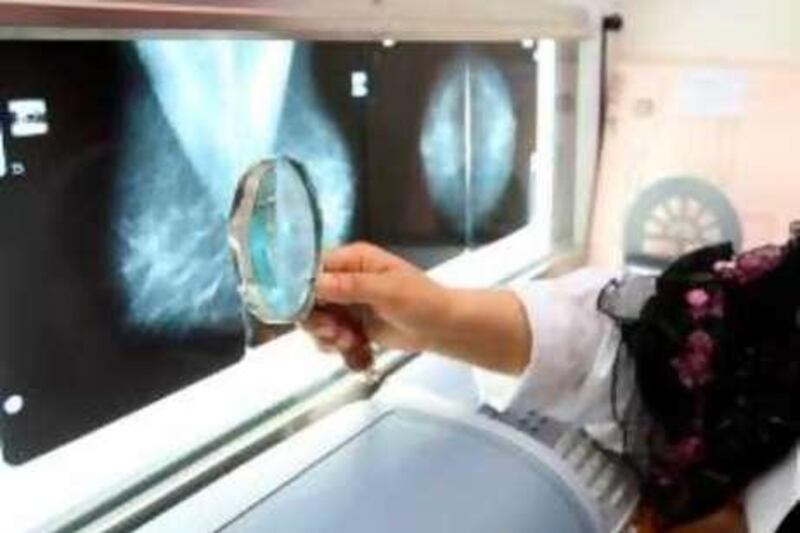After the confirmation in Dubai earlier this month that a 16-year-old girl is suffering from breast cancer, doctors have again called for increased vigilance, particularly among younger women. The girl had been treated in Thailand two years ago for what was believed to be breast cancer. And after a recent consultation at Dubai Hospital, the Emirati girl travelled to Germany where she is now receiving treatment.
Dr Zaid al Mazam, the head of the Breast Unit at the hospital, said doctors had found a 4cm lump in her left breast. "Unfortunately in this country and in the Gulf region we see breast cancer an average of 10 years earlier than the [United] States or Europe," he said. "A 16-year-old is very rare here, but we do have women in their late 20s." Dr Mazam said the problem was not necessarily that the disease hit younger women but that they were less aware of the dangers.
"They need to know what the signs are," he said. "So at least if they develop a lump at a young age, it can be successfully treated." The average age of diagnosis for breast cancer in the UAE is between 35 and 45. "They come to our clinic with a gall bladder stone and we tell them we will examine their breasts, but they say 'no I self-examine', but I don't think many do," he said. "We call them to follow up but you can't force them to come."
Breast cancer is the most common form of cancer in the UAE, accounting for 22.8 per cent of all cases, according to government figures. Only 30 per cent of cases in the UAE, much lower than in western countries, are diagnosed in the early stages when the chances of a cure is much higher. There are no accurate national statistics but in Abu Dhabi last year, there were 20.8 deaths from breast cancer per 100,000 people.
The number of cancer-related deaths in the Eastern Mediterranean Region, which includes the UAE, is predicted to increase by between 100 and 180 per cent over the next 10 years, according to a 2009 World Health Organisation report. "Because of rising incidence and mortality of cancer, unmatched by adequate measures to prevent, detect early and treat cancer, deaths from cancer in the Eastern Mediterranean Region could reach 760,000 per year by the year 2020."
Dr Mazam said although the incidence of cancer is falling in many Western countries, the UAE would probably continue to see a rise until the nation becomes healthier. "It follows a pattern," he said. "In other countries they have learned about the dangers of unhealthy food and no exercise, so the numbers are decreasing. Here we have just discovered these foods so it will be hard to give them up." Dr Adel Anis Hajj, the head of oncology at the Cedars Jebel Ali Hospital in Dubai, said the UAE figures needed more scrutiny before drawing conclusions.
The high number of cases among young people in the UAE, he said, was in part because of the age of the residents. "Many of the people do not live in this country when they are over 50 so it is natural that we see more young cases," he said. "This does not mean young people should not be vigilant." He said the case of the 16-year-old girl highlighted the importance of parents, teachers and medics educating young children, even those in school, about diseases such as breast cancer.
"They should be aware at a young age," he said. "Then if they know what to look out for, they can be diagnosed early. There is a responsibility on the parents, particularly the mothers, to educate their daughters young." The Ministry of Health, Dubai Health Authority and Health Authority-Abu Dhabi have all launched high-profile breast cancer awareness campaigns in recent years. Mobile clinics have been set up to tour the country, particularly rural areas, encouraging women to be screened.
Dr Aly Abdel Razek, the director of the Gulf International Cancer Centre in the capital, said up to half the clinics' patients have breast cancer. The average age is between 35 and 45, but some are as young as 25. "The genetic element is the major factor here," he said. "But other factors such as fatty diets and obesity have all been linked to breast cancer. We need more awareness and healthier lifestyles."
@Email:munderwood@thenational.ae





